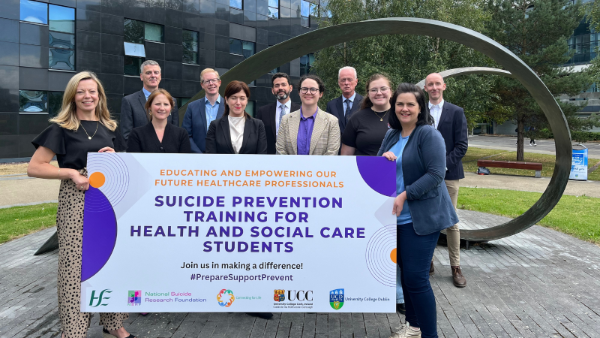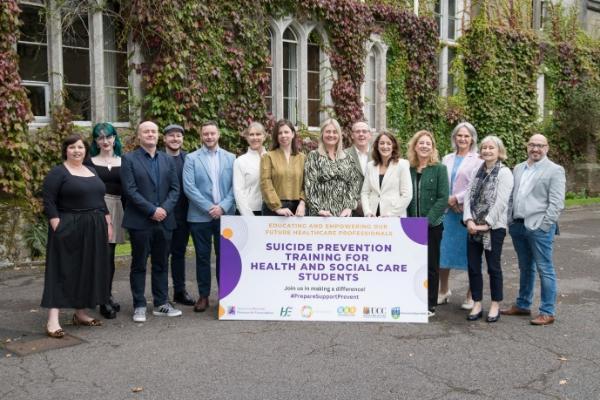The majority of those who die by suicide have had contact with a healthcare professional in the months prior to their death, yet the curricula of most health and social care courses in Ireland lack any sort of suicide prevention training.
In an effort to address this gap, the National Suicide Research Foundation (NSRF) with funding from the Health Service Executive National Office for Suicide Prevention (HSE-NOSP) have spearheaded the development of a suicide prevention training module for undergraduate health and social care students, receiving recent additional support from the UCC Centre for Integrated Research in Teaching and Learning SATLE fund.
Today, September 10th is World Suicide Prevention Day, and marks the launch of recruitment to an optional four-week pilot of this module for 1st- 4th year health and social care students at University College Dublin (UCD) and University College Cork (UCC).
UCD leading the way
Set to be piloted in October, this work represents a crucial step towards integrating suicide prevention training into the education of future healthcare professionals.
Prof Colin Scott, UCD Registrar, Deputy President and Vice-President for Academic Affairs welcomed the launch stating, "UCD is working nationally with all relevant agencies around enhancing student well being in general and initiatives on suicide prevention in particular. In this context the new module to train students in healthcare areas around suicide prevention is very welcome."
Prof Jonathan McNulty, Vice-Principal for Teaching and Learning in the College of Health and Agricultural Sciences says, “UCD is proud to be supporting this initiative, which aligns with Ireland's National Suicide Prevention Strategy, "Connecting for Life", the Department of Health’s “Sharing the Vision” Mental Health Policy, and contributes to the Higher Education Authority’s “National Student Mental Health and Suicide Prevention Framework”.
Mr Niall Dennehy, Project Manager of the Student Mental Health and Suicide Prevention Project and UCD adds, “The university's involvement in this project is a testament to its commitment to producing healthcare professionals who are prepared to support individuals at risk of suicide.”
 Members of the UCD project team and sponsors (Back Row L-R): Professor Rory Breathnach, Dean and Head of the UCD School of Veterinary Medicine, Professor Jonathan McNulty, Vice-Principal for Teaching and Learning, College of Health and Agricultural Sciences; Professor Jason Last, UCD Dean of Students; Professor Michael Keane, Dean and Head of the UCD School of Medicine; Associate Professor James Matthews, Head of the UCD School of Public Health, Physiotherapy and Sports Science. (Front Row L-R): Dr Claire Magner, School of Nursing, Midwifery and Health Systems; Sarah Woods, Lead for Strategy Implementation, Stakeholder Engagement and Education, HSE National Office for Suicide Prevention; Associate Professor Anne Doherty, Head of Subject for Psychiatry, School of Medicine; Dr Margaret Gallagher, School of Medicine; Ciara Donohue, Welfare Officer, UCD Student Union; Dr Pamela Kelly, School of Veterinary Medicine.
Members of the UCD project team and sponsors (Back Row L-R): Professor Rory Breathnach, Dean and Head of the UCD School of Veterinary Medicine, Professor Jonathan McNulty, Vice-Principal for Teaching and Learning, College of Health and Agricultural Sciences; Professor Jason Last, UCD Dean of Students; Professor Michael Keane, Dean and Head of the UCD School of Medicine; Associate Professor James Matthews, Head of the UCD School of Public Health, Physiotherapy and Sports Science. (Front Row L-R): Dr Claire Magner, School of Nursing, Midwifery and Health Systems; Sarah Woods, Lead for Strategy Implementation, Stakeholder Engagement and Education, HSE National Office for Suicide Prevention; Associate Professor Anne Doherty, Head of Subject for Psychiatry, School of Medicine; Dr Margaret Gallagher, School of Medicine; Ciara Donohue, Welfare Officer, UCD Student Union; Dr Pamela Kelly, School of Veterinary Medicine.
Module Overview
Dr. Claire Magner, National Consultation Group member, Head of Subject for Children's Nursing, and Assistant Professor and Lecturer in Children’s Nursing at UCD explains, “This module, developed by the National Suicide Research Foundation has been informed by a comprehensive research process. This includes a scoping review of international literature, a national survey of health and social care academics, a World Café of key stakeholders, and focus groups of undergraduate healthcare students.”
The module content is structured into four weekly two-hour in-person sessions, covering critical topics including risk and protective factors, effective communication skills and safety planning.
Personal wellbeing is an integral aspect of the module, interwoven throughout. Participants are encouraged to reflect on their own wellbeing as both students and future healthcare professionals, to take small but tangible actions in this regard.
An additional unique aspect of the pilot study is its interprofessional approach, designed to bring together students from various health and social care disciplines. "The interprofessional learning content and workshops offered in this module are a unique and valuable opportunity for students from different disciplines to learn about and from each other on how they can collaborate in future practice to support people at risk of suicide, and their families." said Prof Jason Last, Dean of Students at UCD.
Pilot and Evaluation
The four-week module is being offered to UCD 1st-4th year health and social care students from the October 1st, with Tuesday or Wednesday evening sessions being delivered on campus from 5:30 – 7:30pm. The training will be evaluated through pre- and post-surveys, and follow-up interviews, to assess its effectiveness, accessibility, feasibility, and appropriateness. Ethical approval has been granted, and all necessary support and safety protocols are in place in the event that any participant finds the topic distressing. Participation in the module is entirely voluntary, and students who complete the module will receive a certificate of attendance.
Mr. John Meehan, Assistant National Director, Mental Health Planning and Head of the National Office for Suicide Prevention says, “The HSE National Office for Suicide Prevention (NOSP) warmly welcomes the pilot introduction of a new and innovative Suicide Prevention Module for undergraduate health and social care students in University College Cork and University College Dublin. The development and introduction of the module supports actions in Connecting for Life, Ireland’s National Strategy to Reduce Suicide (2015-2024), and specifically the incorporation of suicide prevention training as part of undergraduate curriculum of the relevant professions. Embedding suicide prevention learning at undergraduate level, will help ensure that the health and social care professionals of the future, will feel more equipped to understand and to help to prevent suicide, in so many different ways. The HSE NOSP sees this as an important enabler to realise the vision of an Ireland where fewer lives are lost to suicide.”
The findings from this pilot will inform future iterations of the module and the development of a train-the-trainer programme, ultimately making suicide prevention education available to all health and social care courses nationally.
Call to Action
Relevant staff at UCD are encouraged to support this initiative by promoting the module to their respective undergraduate health and/or social care students. A PowerPoint slide with embedded recruitment video and QR code is available for use here.
For further information or specific queries, you can contact Dr. Michelle O’Driscoll at michelle.odriscoll@ucc.ie or Dr. Claire Magner at claire.magner@ucd.ie
Dr. Michelle O’Driscoll and Ms. Kerrie Gallagher of the NSRF would like to extend sincere thanks to all those involved in the development and implementation of this initiative including the UCD Working Group, National Consultation Group members, colleagues from the National Suicide Research Foundation (NSRF), the HSE National Office for Suicide Prevention (NOSP), University College Cork (UCC), and study participants to date.
For information on mental health supports and services closest to you freephone: 1800 111 888, visit: Mental health – HSE.ie or make contact with your GP. In an emergency situation please call 999 or 112.
UCD Student Health Services- UCD Student Health
UCD Student Counselling Service – UCD Student Counselling
 The UCC and NSRF project teams: Dr. Samantha Dockray, Senior Lecturer, School of Applied Psychology; Lucrecia Luna Smee, Welfare Officer, UCC; Student Union Executive; Dr Owen Jump, Lecturer, Centre for the Integration of Research Teaching & Learning (CIRTL) UCC; Dr James O’Mahony, National Consultation Group member, Pilot Facilitator, Lecturer and Programme Lead for the MSc/ Pg Diploma in Cognitive & Behavioural Psychotherapy, School of Nursing and Midwifery; Dr Johnny Goodwin, Pilot Facilitator and Lecturer in Mental Health Nursing, School of Nursing and Midwifery; Dr. Aoife O’ Sullivan, Mental Health Lead, Irish College of General Practitioners and General Practitioner with University College Cork Student Health Department; Dr Eve Griffin, CEO, NSRF; Kerrie Gallagher, Project Research Officer, NSRF; Prof. Stephen Byrne, Deputy President and Registrar; Dr Michelle O’Driscoll, Project Senior Postdoctoral Researcher NSRF and Lecturer in Clinical Pharmacy, School of Pharmacy; Prof. Laura Sahm, National Consultation Group member, Vice Dean of School, and Head of Clinical Pharmacy Practice School of Pharmacy; Prof Helen Whelton, Head of College of Medicine and Health; Prof Ella Arensman, Chief Scientist, National Suicide Research Foundation, Head of School of Public Health and Professor of Public Mental Health, School of Public Health, College of Medicine and Health; Martin Ryan, Resource Officer for Suicide Prevention, HSE National Office for Suicide Prevention.
The UCC and NSRF project teams: Dr. Samantha Dockray, Senior Lecturer, School of Applied Psychology; Lucrecia Luna Smee, Welfare Officer, UCC; Student Union Executive; Dr Owen Jump, Lecturer, Centre for the Integration of Research Teaching & Learning (CIRTL) UCC; Dr James O’Mahony, National Consultation Group member, Pilot Facilitator, Lecturer and Programme Lead for the MSc/ Pg Diploma in Cognitive & Behavioural Psychotherapy, School of Nursing and Midwifery; Dr Johnny Goodwin, Pilot Facilitator and Lecturer in Mental Health Nursing, School of Nursing and Midwifery; Dr. Aoife O’ Sullivan, Mental Health Lead, Irish College of General Practitioners and General Practitioner with University College Cork Student Health Department; Dr Eve Griffin, CEO, NSRF; Kerrie Gallagher, Project Research Officer, NSRF; Prof. Stephen Byrne, Deputy President and Registrar; Dr Michelle O’Driscoll, Project Senior Postdoctoral Researcher NSRF and Lecturer in Clinical Pharmacy, School of Pharmacy; Prof. Laura Sahm, National Consultation Group member, Vice Dean of School, and Head of Clinical Pharmacy Practice School of Pharmacy; Prof Helen Whelton, Head of College of Medicine and Health; Prof Ella Arensman, Chief Scientist, National Suicide Research Foundation, Head of School of Public Health and Professor of Public Mental Health, School of Public Health, College of Medicine and Health; Martin Ryan, Resource Officer for Suicide Prevention, HSE National Office for Suicide Prevention.